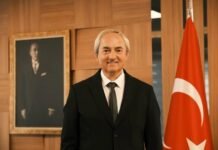
Turkish autocratic President Recep Tayyip Erdoğan had demanded Reza Zarrab’s (a Turkish-Iranian gold dealer who is about to go on trial on money-laundering and fraud charges in the US) release as well as the firing of then-US Attorney Preet Bharara in a private meeting with then-US Vice President Joe Biden on September 21, 2016. , in which US officials say half the 90-minute conversation was devoted to Zarrab, wrote prominent journalist David Ignatius for the Washington Post on Thursday.
Stating that “Erdoğan’s campaign to free Zarrab has been extraordinary,” even immediately after the controversial cuop attempt on July 15, 2016, Ignatius wrote that “Erdoğan’s wife (Emine Erdoğan) pleaded the case that night to Jill Biden. Turkey’s then-justice minister, Bekir Bozdag, visited then-Attorney General Loretta E. Lynch in October (2016) to argue that the case was ‘based on no evidence’ and that Zarrab should be released.”
Moreover, according to information given by Ignatius’ Washington Post article, Erdoğan has also appealed personally about the matter in his last two phone calls with former US President Barack Obama, in December and early January, former aides say. “Our operating assumption was that Erdoğan’s obsession with the case was that if it moved forward, information would come out that would damage his family, and ultimately him,” said one former senior Obama official.
Turkey-US confrontation sharpened on Thursday, as Erdoğan protested in Ankara that Reza Zarrab was being squeezed as a “false witness” about corruption. “Turkey alarmed Washington by arresting a US consular official last week, in what some U.S. officials feared was an attempt to gain leverage for Zarrab’s release before the scheduled November 27 start of his trial in New York. Turkish and American officials plan to meet next week for talks to ease tensions,” wrote Ignatius.
Erdoğan said on Thursday that the US has been trying to use Zarrab as an informer. “You [the US] arrested my citizen [Reza Zarrab]. And you try to use him as an informer,” Erdoğan said while speaking to provincial governors at the presidential palace in Ankara.
The article stated that Erdoğan’s government began cultivating Donald Trump’s team before the election. Michael Flynn, then a campaign aide, was hired as a pro-Turkey lobbyist, and his firm continued to receive Turkish money during the transition. “After Flynn resigned as national security adviser in February, the Turks began working with Rudy Giuliani, a close Trump adviser,” added Ignatius.
According to the article, “Erdoğan may have hoped that Trump would support his push to free Zarrab. And Trump initially seemed sympathetic to the Turkish leader, inviting him to Washington for a May meeting. But that visit was marred when Erdoğan’s security detail attacked protesters outside the Turkish ambassador’s residence; and Trump’s maneuvering room has narrowed because of investigations surrounding his administration.”
“Some US officials fear that Erdoğan might be seeking bargaining chips in the detention of pastor Andrew Brunson, arrested a year ago on charges he backed Gülen (movement), and the arrest last week of Metin Topuz, a longtime employee of the US consulate in İstanbul, who a Turkish newspaper has alleged was in contact with a pro-Gülen prosecutor back in 2013. And Erdoğan himself suggested last month a trade of Brunson for Gülen,” wrote Ignatius.
Zarrab was arrested in Miami in March 2016 as part of an investigation into the violation of US sanctions on Iran.
Erdoğan also criticized the arrest of Turkey’s Halkbank Deputy General Manager Mehmet Hakan Atilla in the US as part of the same investigation in March 2017. The US District Court for the Southern District of New York on Sept. 6 indicted former Turkish Economy Minister Mehmet Zafer Çağlayan, former Halkbank General Manager Süleyman Aslan, Levent Bakkal and Abdullah Happani and ordered an arrest warrant for them.
The four are charged with conspiring to use the US financial system to conduct hundreds of millions of dollars’ worth of transactions on behalf of the government of Iran and other Iranian entities barred by US sanctions.
Erdoğan stated in September that he had told Washington that Turkey had never agreed to comply with its sanctions on Iran and called on the US to review the indictment. He also said US President Donald Trump had called him and agreed to follow the case more closely.
Zarrab was the prime suspect in a major corruption investigation in Turkey that became public in December 2013 in which with others from the inner circle of the ruling Justice and Development Party (AKP) government and then-Prime Minister Erdoğan for having paid Cabinet-level officials and bank officers bribes to facilitate transactions benefiting Iran.
After Erdoğan cast the case as a coup attempt to overthrow his government orchestrated by his political enemies, several prosecutors were removed from the case, police were reassigned and the investigation against Zarrab was dropped.
The indictment that was filed by Joon H. Kim, the acting US attorney for the Southern District of New York on Wednesday, also charged four defendants with lying to US government officials about those transactions; laundering funds in connection with those transactions including millions of dollars in bribes to Çağlayan and others; and defrauding several financial institutions by concealing the true nature of the transactions.
According to a statement from the US Attorney’s Office on Wednesday, Çağlayan is alleged to have received tens of millions of dollars worth of bribes in cash and jewelry from the proceeds of the scheme to provide services to the government of Iran and to conceal those services from US government officials. Using his position as minister of the economy, Çağlayan directed other members of the scheme, including officers of Halkbank, to engage in certain types of deceptive transactions, approved the steps taken by other members to implement the scheme, and protected the scheme from competitors as well as from scrutiny. As a result, the co-conspirators induced US banks to unknowingly process international financial transactions in violation of sanctions on Iran.
The superseding Indictment further alleges that Çağlayan’s co-defendants – Turkish-Iranian gold trader Reza Zarrab, aka Rıza Sarraf, Halkbank executive Mehmet Hakan Atilla, Mohammad Zarrab, Camelia Jamshidy, aka Kamelia Jamshidy, and Hossein Najafzadeh, who previously were charged in this case with the same offenses – participated in the same crimes.















